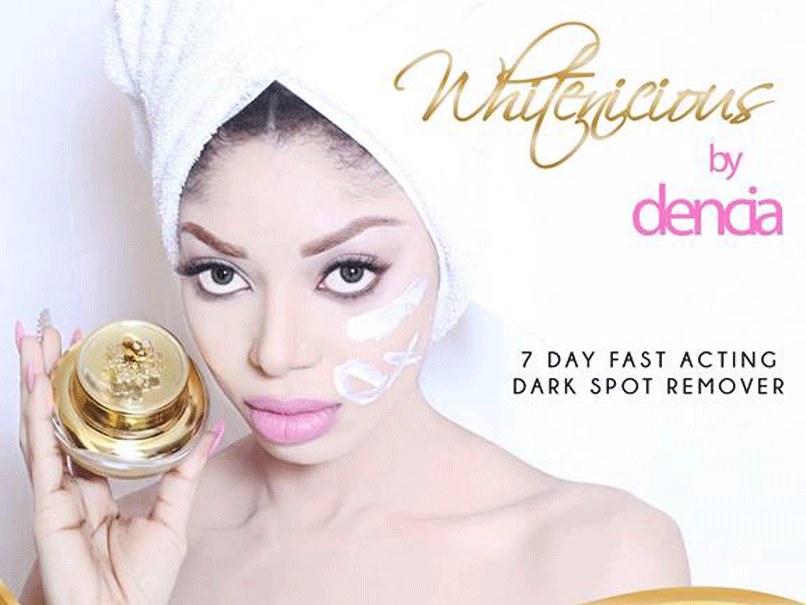'People really want to buy it': African pop star defends her controversial skin-lightening cream
Whitenicious is described as a '7 day fast acting dark spot remover'

A black African pop singer who launched a skin-lightening product has hit back at critics who disparaged her for promoting skin-bleaching.
In an interview with Ebony, Dencia defended the Whitenicious product, which is advertised as a “7 day fast acting dark spot remover”, and claimed that it was not intended to be used as an all-over whitening cream.
“The picture clearly says ‘Say goodbye to dark spots and hyperpigmentation’,” the Nigerian-Cameroonian singer said.
“I’m not saying ‘say goodbye to your black skin and try to be like Dencia’. That’s not what I’m saying. I’m saying ‘say goodbye to dark spots and hyperpigmentation’.”
But many have criticised her for sowing the seeds of self-hatred among women with darker skin, particularly African women.
They have also highlighted Dencia’s own drastically altered appearance since she started using Whitenicious. Pictures of her taken in 2011 show her with much darker skin than in the advertisement images.
“I was never that dark in real life,” she said.
“And guess what? I don’t even care because they’re bringing me business. Because when you take that picture and you put a picture of Dencia darker, this is what you’re telling people – the product really works.
"And guess what? People really want to buy it. It’s what it is. I don’t really care.”
But Dencia emphasised that she is not extolling skin bleaching and said “dark skin is beautiful”.
“These girls are not trying to bleach their skin. They’re just trying to get rid of these little things that is making them feel uncomfortable, you know?” she added.
She also said that the majority of her customers are African-Americans, as opposed to Africans.
“Now, do you think Africans are lightening to appeal to the white man? No, they’re not because the white man doesn’t even like the light Africans. They like the black Africans,” she said.
“Look at all the Africans that are successful in the world. They are as black as Alek Wek. And if I was as black as Alek Wek, I would never ever use anything on my skin. Trust me I wouldn’t.”
However, Dencia did concede that Whitenicious can be used as an all-over skin-lightening product, but suggested few people would use it for this purpose, because it is too expensive.
“Whitenicous comes in 30 ml and 60ml. You cannot use the 60 ml to bleach your whole skin. It’s impossible. And that costs about $150 each,” she said.
“I don’t see anybody spending all that money to bleach their entire skin. I don’t see that happening.
“Now, do I have customers who come and buy stuff for over $2000? Yes, I do. Do I ask them what they want to do with it? No, I don’t.
“Do I know what they want to do with it? No, I don’t care because it’s their money, it’s how they want to spend it.”
Dencia went on to question the validity of medical research that links skin-bleaching products to cancer.
“Contrary to what people are saying ‘Oh, this is going to cause you cancer’. No, it wouldn’t. Whitening your skin will not cause you cancer,” she asserted.
Check out these other controversial adverts
Skin-bleaching has been a controversial topic in recent years, with many high-profile celebrities being drawn into the debate.
Last month, Vanity Fair was accused of lightening Kenyan actress Lupita Nyong'o's skin when she appeared as the cover star of the February issue.
And in 2012, pop singer Beyoncé appeared significantly lighter-skinned in a L’Oreal Paris advertisement, while in 2011, Vogue issued a statement denying that they had altered the colour of Rihanna’s skin on the front cover of their November issue.
But for Dencia, the answer is simple.
“Whitenicious is what it is,” she said.
“Take people for who they are and accept people for being honest about who they are, what they do and all that.”
Subscribe to Independent Premium to bookmark this article
Want to bookmark your favourite articles and stories to read or reference later? Start your Independent Premium subscription today.

Join our commenting forum
Join thought-provoking conversations, follow other Independent readers and see their replies